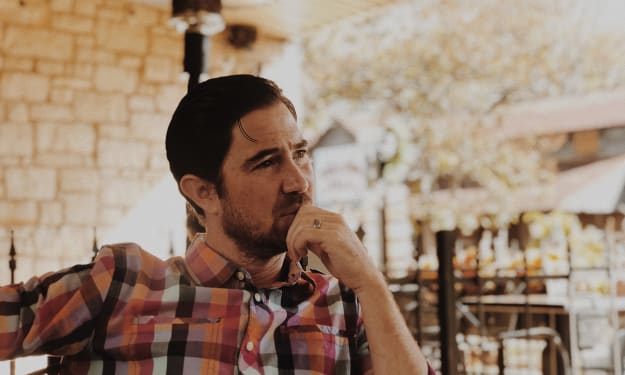Stay With Me, Baby
A shard of glass nearly took my dad's life, and he watched the whole thing happen from across the room.

My father told me a story once about his first out of body experience.
He had been young, 6 or so, the age when it seems like you shouldn't remember most things. This memory, though, remained clear as ice. It was freezing in Texas, with frost dusting the packed dirt around his family's farmhouse.
A couple of neighbor boys, Richard and Lyle, came by to see if my dad wanted to play with them. Bundled in a warm coat, he set off down the tree-lined path with the rosy-cheeked friends he'd trust with his life, any day, any minute; mostly because he didn't think much about life or death or dying. He was only 6.
Maybe every now and then, fleetingly, he thought about the great beyond. His mother and father, both devout Baptists, would drag him to church every Sunday and make him sit in the front pew while he fidgeted with the laces on his shoes. The preacher talked about death a lot. He'd say that any minute the air could get sucked out of the sky and if you didn't have Jesus in your heart, you'd get dragged into hell. Most times, the sermons would scare him.
My dad preferred to pray at home, in his bed, under the covers. He liked talking to god as if he was the brother he never had; or the father he would have preferred. Years down the line, when I told my father I didn't like going to church, he didn't push me. I eventually would become like him, lying in bed and praying up at the ceiling rather than fidgeting in a pew. As time passed, after realizing how firmly we trusted each other with our quiet worship, we stopped praying altogether.
My father's family had lived on that old plot of land for years, which meant the houses around them had begun to sag and wilt into the mud. 'Good bones' became brittle, and structures wrinkled and aged like the dying residents within.
One house in particular had always been of interest to the mischievous band of boys. It was a tiny brown house a few miles from my father's home and that rare frigid Texas afternoon seemed like a good a time as any to venture inside and to see what waited for them within.
The house had been abandoned. It was empty, dusty, and dark. There were a couple of boxes scattered around filled with construction materials: nails, boards, and a hammer or two. Dust covered every surface. On the far side of the room, a pile of old glass sat, perhaps meant at one point to replace some of the cracked panes lining the walls.
Lyle, the younger boy, grabbed a hammer and swung it around like a baseball bat.
"Cool!" he exclaimed, his excitement for the simple tool perfectly explaining the simple joys that only children could appreciate. Richard, the older boy, picked up a shard broken from the pane of glass and held it as if it were a skipping stone.
"Think you can hit this?" he asked Lyle. My father, grinning from ear to ear, watched the two boys interact safely behind the arc of the hammer.
"Just call me Willie Mays," Lyle cried, taking a few practice swings. Richard got ready to throw the glass like a frisbee, positioning his body sideways to get the perfect arc. Then, after a few practice movements, he sent the shard flying.
In a perfect world, my dad would have covered his eyes as the glass met the metal of the hammerhead. Tiny shards would have fallen around him, perhaps nicking his skin lightly, requiring a bandage from a disappointed mother later in the evening. What really happened was much worse.
My dad doesn't remember any pain. He doesn't even remember the moment of impact. When the thin glass's velocity was too much for Lyle, he ducked at the last minute, making my father's forehead the only target. My father doesn't remember turning just slightly, so that the glass, instead of shattering against his face, sailed by instead, dragging its jagged edge across his head and slicing his forehead open.
The only thing he remembers is sitting in the rafters of the house, watching his friends stand over his lifeless body. They cried his name, but the sounds were muffled. My dad, for a moment, didn't realize that the body on the ground was him, that the blood pooling on the floor around his friends was his own.
He watched as Richard, sobbing, screamed at Lyle to get his mother. Lyle lived the closest; despite only being 7, he darted out of the house and towards help with the conviction of someone much older. It was just Richard and Michael and Michael, but up in the rafters. When had he gotten so high? Why couldn't Richard see him up here, too?
He tried to say his name but Richard was crying too hard, rocking back and forth, his eyes trained on something in the far corner. My dad looked over at where his eyes were trained and saw a shattered pile of glass covered in blood.
Wait, he realized, there's a lot of blood in here. How much do I have in my body? Do I have enough left?
The next few minutes were a blur of fear and confusion. The roar of an engine was heard outside, and Lyle ran back into the house with his mother, who screamed when she saw my father's lifeless body on the ground. She picked him up and set him gently on a rickety table near a window. She took off her white sweater and wrapped it around his forehead, the delicate white cashmere growing dark with blood. She carried him away.
My father blinked and found himself on the ceiling of an operating room. He looked down at a beautiful African-American woman in a nurse's uniform who stitched him up slowly, and her associate, a young man who looked pale and terrified handed her a damp cloth every few seconds to clean up any residual blood. The woman cooed at my father, and he wondered if she knew a part of him was awake and in that room.
"Stay with me, baby," she said softly.
"Okay," my father answered from the corner.
My dad remembers waking up much later, when the sun had finally dipped below the horizon and dark had begun to seep in through the hospital windows. He remembers opening his eyes and seeing the nurse, who smiled at him with recognition and said, "Welcome back."
He remembers the shouting from his father, loud and disappointed, even in the crowded emergency room. I think he learned then that he was never going to be a shouter. He would never lean over his daughter's hospital beds and tell them that they'd failed him; he would tell them that he was just happy they were alive and breathing and well. He would hold their hands and coo at them like the kind nurse did to him in the operating room as she weaved a dark stitch through his delicate skin.
He remembers the tears from his mother, the ones that didn't seem to stop, even long after they'd returned home. Maybe that's when he learned what unconditional love was, or what it was like to be a parent and feel like you could lose the person in your life you loved the most.
OK, maybe he didn't learn that at 6. However, later in his life when my sister was a toddler, hit her head, and needed staples, I think he felt that same way: like your worst fears, the fears that your children aren't invincible and could need fixing and stitching and putting back together, have become a gruesome reality. In that moment he picked her up, wrapped her head with the gauze that he always kept on-hand, and drove like hell to the emergency room.
My father would grow up to go through other traumas: car accidents, broken bones, intensive surgeries; but he never left his body again. He never watched from afar as a part of him began to die, and then slowly get brought back to life. He was never asked by anyone again to stay in this life, rather than be dragged to another plane. While he was grateful for that, he'd never been able to shake the memory of the pane of glass sailing across the room, the screams of his closest friends, and the soft, reassuring, Stay with me, baby.
He stayed, and I'm grateful.






Comments
There are no comments for this story
Be the first to respond and start the conversation.